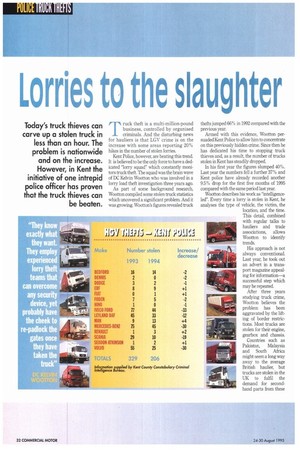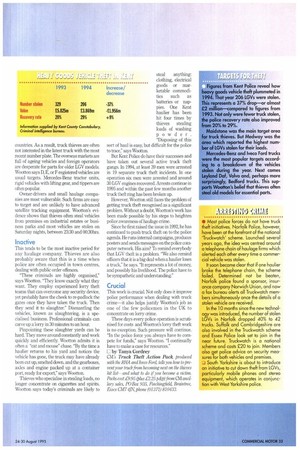Lorries t the slaughter
Page 34

Page 35

If you've noticed an error in this article please click here to report it so we can fix it.
Today's truck thieves can carve up a stolen truck in less than an hour. The problem is nationwide and on the increase. However, in Kent the initiative of one intrepid police officer has proven that the truck thieves can be beaten.
Truck theft is a multi-million-pound business, controlled by organised criminals. And the disturbing news for hauliers is that LGV crime is on the increase with some areas reporting 20% hikes in the number of stolen lorries.
Kent Police, however; are beating this trend. It is believed to be the only force to have a dedicated "lorry squad'' which constantly monitors truck theft. The squad was the brain wave of DC Kelvin Wootton who was involved in a lorry load theft investigation three years ago.
As part of some background research. Wootton compiled some stolen truck statistics which uncovered a significant problem. And it was growing. Wootton's figures revealed truck thefts jumped 66% in 1992 compared with the previous year.
Armed with this evidence, Wootton persuaded Kent Police to allow him to concentrate on this previously hidden crime. Since then he has dedicated his time to stopping truck thieves and, as a result, the number of trucks stolen in Kent has steadily dropped.
In his first year the figures slumped 40%. Last year the numbers fell a further 37% and Kent police have already recorded another 9.5% drop for the first five months of 1995 compared with the same period last year.
Wootton describes his work as "intelligenceled". Every time a lorry is stolen in Kent, he analyses the type of vehicle, the victim, the location, and the time. This detail, combined with regular talks to hauliers and trade associations, allows Wootton to identify trends.
His approach is not always conventional. Last year, he. took out an advert in a transport magazine appealing for information—a successful step which may be repeated.
After three years studying truck crime, Wootton believes the problem has been aggravated by the lifting of border restrictions. Most trucks are stolen for their engine, gearbox and chassis.
Countries such as Pakistan, Malaysia and South Africa might seem a long way away to the average British haulier, but trucks are stolen in the UK to fulfil the demand for secondhand parts from these countries. As a result, truck thieves are often not interested in the latest truck with the most recent number plate. The overseas markets are full of ageing vehicles and foreign operators are desperate for parts for older LGV models. Wootton says D, E, or Flegistered vehicles are usual targets. Mercedes-Benz tractor units, rigid vehicles with lifting gear, and tippers are often popular.
Owner-drivers and small haulage companies are most vulnerable. Such firms are easy to target and are unlikely to have advanced satellite tracking equipment. Wootton's evidence shows that thieves often steal vehicles from premises on industrial estates or business parks and most vehicles are stolen on Saturday nights, between 23:30 and 00:30hrs.
Inactive
This tends to be the most inactive period for any haulage company. Thieves are also probably aware that this is a time when police are often occupied in town centres, dealing with public order offences.
"These criminals are highly organised," says Wootton. They know exactly what they want. They employ experienced lorry theft teams that can overcome any security device, yet probably have the cheek to re-padlock the gates once they have taken the truck. Then they send it to slaughter." Dismantling the vehicles, known as slaughtering, is a specialised business. Professional criminals can carve up a lorry in 30 minutes to an hour.
Pinpointing these slaughter yards can be hard. They move around constantly and work quickly and efficiently. Wootton admits it is often a "cat and mouse" chase. "By the time a haulier returns to his yard and notices the vehicle has gone, the truck may have already been cut up, smelted down, and the gearboxes, axles and engine packed up at a container port, ready for export," says Wootton.
Thieves who specialise in stealing loads, no longer concentrate on cigarettes and spirits. Wootton says today's criminals are likely to steal anything: clothing, electrical Increase/ decrease
-37% -fi.956m +9% goods or marketable commodities such as batteries or nappies. One Kent haulier has been hit four times by thieves stealing loads of washing powder. "Disposing of this sort of haul is easy, but difficult for the police to trace," says Wootton.
But Kent Police do have their successes and have taken out several active truck theft gangs. In 1994, at least 39 men were arrested in 19 separate truck theft incidents. In one operation six men were arrested and around 30 ILI,' engines recovered. Arrests continue in 1995 and within the past few months another truck theft ring has been broken up.
However, Wootton still faces the problem of getting truck theft recognised as a significant problem. Without a doubt, Wootton's work has been made possible by his steps to heighten police awareness of haulage crime.
Since he first raised the issue in 1992, he has continued to push truck theft on to the police agenda. He runs internal campaigns, produces posters and sends messages on the police computer network. His aim? To remind everybody that WV theft is a problem. "We also remind officers that it is a big deal when a haulier loses a truck," he says. "It represents a lot of money, and possibly his livelihood. The police have to be sympathetic and understanding."
Crucial
This work is crucial. Not only does it improve police performance when dealing with truck crime—it also helps justify Wootton's job as one of the few policemen in the UK to concentrate on lorry crime.
These days every police operation is scrutinised for costs and Wootton's lorry theft work is no exception. Such pressure will continue. "In the police force you always have to compete for funds," says Wootton. "I continually have to make a case for resources."
12 by Tanya Cordrey CM's Truck Theft Action Pack produced with the RI-IA and Iveco For4 tells you how to prevent your truck from becoming next on the thieves hit list—and what to do if you become a victim. Packs cost .19.95 Obis 1225 p&p) from CM ancillary sales, PO Box 935, Finchingfield, Braintree, Essex 01/17 417■1, phone (01371) 810433.




























































































































